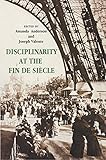Disciplinarity at the Fin de Siècle / ed. by Joseph Valente, Amanda Anderson.
Material type: TextPublisher: Princeton, NJ : Princeton University Press, [2021]Copyright date: ©2002Description: 1 online resource (352 p.)Content type:
TextPublisher: Princeton, NJ : Princeton University Press, [2021]Copyright date: ©2002Description: 1 online resource (352 p.)Content type: - 9780691227559
- English literature -- 19th century -- History and criticism -- Theory, etc
- Universities and colleges -- Curricula -- Great Britain
- LITERARY CRITICISM / Semiotics & Theory
- Annual Reports (Bosanquet)
- Anti-Machiavel (Frederick the Great)
- Arnold, Thomas
- Bhagavadgita
- Boas, Franz
- Bosanquet, Bernard
- Butler, Judith
- Carlyle, Thomas
- Charlotte, Princess
- Cornhill
- Dictionary (Bailey)
- Dowden, Edward
- Ebbinghaus, Hermann
- Edinburgh Review
- Erasmus
- Filostrato (Boccaccio)
- Fraser's Magazine
- Fukuyama, Francis
- Giddings, Franklin
- Goffman, Erving
- Heart of Darkness (Conrad)
- Heretics (Chesterton)
- Hubert, Henri
- Jackson, Hughlings
- Jowett, Benjamin
- Kant, Immanuel
- Kuklick, Henrika
- Leenhardt, Maurice
- Leopold, Prince
- Louis XV
- Meacham, Standish
- Morris, William
- News from Nowhere (Morris)
- Oeconomies royales (Sully)
- On Liberty (Mill)
- Pater, Walter
- Pawde, Kumud
- Planck, Max
- Popular Science Monthly
- Quesnay, François
- Revue Philosophique
- Réville, Albert
- Sartor Resartus (Carlyle)
- Tennyson, Lord Alfred
- Troilus (Chaucer)
- Vincent, Samuel
- Voltaire
- Weber, Max
- Wright, Chauncey
- Zunz, Olivier
- de Senancour, Etienne
- online - DeGruyter
| Item type | Current library | Call number | URL | Status | Notes | Barcode | |
|---|---|---|---|---|---|---|---|
 eBook
eBook
|
Biblioteca "Angelicum" Pont. Univ. S.Tommaso d'Aquino Nuvola online | online - DeGruyter (Browse shelf(Opens below)) | Online access | Not for loan (Accesso limitato) | Accesso per gli utenti autorizzati / Access for authorized users | (dgr)9780691227559 |
Frontmatter -- Contents -- Acknowledgments -- Introduction. Discipline and Freedom -- PART I. Disciplinary Formations -- Chapter 1. Literary Study and the Modern System of the Disciplines -- Chapter 2. Disciplinary and Radicality: Quantum Theory and Nonclassical Thought at the Fin de Siecle, and as Philosophy of the Future -- PART II. Disciplines and Professionalism -- Chapter 3. How Economics Became a Science: A Surprising Career of a Model Discipline -- Chapter 4. Professional Status and the Moral Order -- Chapter 5. Durkheim, Disciplinarity, and the "Sciences Religieuses" -- PART III. Disciplines of the Self -- Chapter 6. Subjecting English and the Question of Representation -- Chapter 7. Dying Twice: Victorian Theories of Deja Vu -- Chapter 8. Oscar Wilde, Erving Goffman, and the Social Body Beautiful -- PART IV. Discipline and the State -- Chapter 9. Character and Pastorship in Two British "Sociological" Traditions: Organized Charity, Fabian Socialism, and the Invention of New Liberalism -- Chapter 10. Victorian Continuities: Early British Sociology and the Welfare of the State -- PART V. Disciplinary Contests and the Present Horizon -- Chapter 11. The Arnoldian Ideal, or Culture Studies and the Problem of Nothingness -- Chapter 12. Notes on the Defenestration of Culture -- Notes on Contributors -- Index
restricted access online access with authorization star
http://purl.org/coar/access_right/c_16ec
Contemporary celebrations of interdisciplinary scholarship in the humanities and social sciences often harbor a distrust of traditional disciplines, which are seen as at best narrow and unimaginative, and at worst complicit in larger forms of power and policing. Disciplinarity at the Fin de Siècle questions these assumptions by examining, for the first time, in so sustained a manner, the rise of a select number of academic disciplines in a historical perspective. This collection of twelve essays focuses on the late Victorian era in Great Britain but also on Germany, France, and America in the same formative period. The contributors--James Buzard, Lauren M. E. Goodlad, Liah Greenfeld, John Guillory, Simon Joyce, Henrika Kuklick, Christopher Lane, Jeff Nunokawa, Arkady Plotnitsky, Ivan Strenski, Athena Vrettos, and Gauri Viswanathan--examine the genealogy of various fields including English, sociology, economics, psychology, and quantum physics. Together with the editors' cogent introduction, they challenge the story of disciplinary formation as solely one of consolidation, constraint, and ideological justification. Addressing a broad range of issues--disciplinary formations, disciplinarity and professionalism, disciplines of the self, discipline and the state, and current disciplinary debates--the book aims to dislodge what the editors call the "comfortable pessimism" that too readily assimilates disciplines to techniques of management or control. It advances considerably the effort to more fully comprehend the complex legacy of the human sciences.
Mode of access: Internet via World Wide Web.
In English.
Description based on online resource; title from PDF title page (publisher's Web site, viewed 27. Jan 2023)


